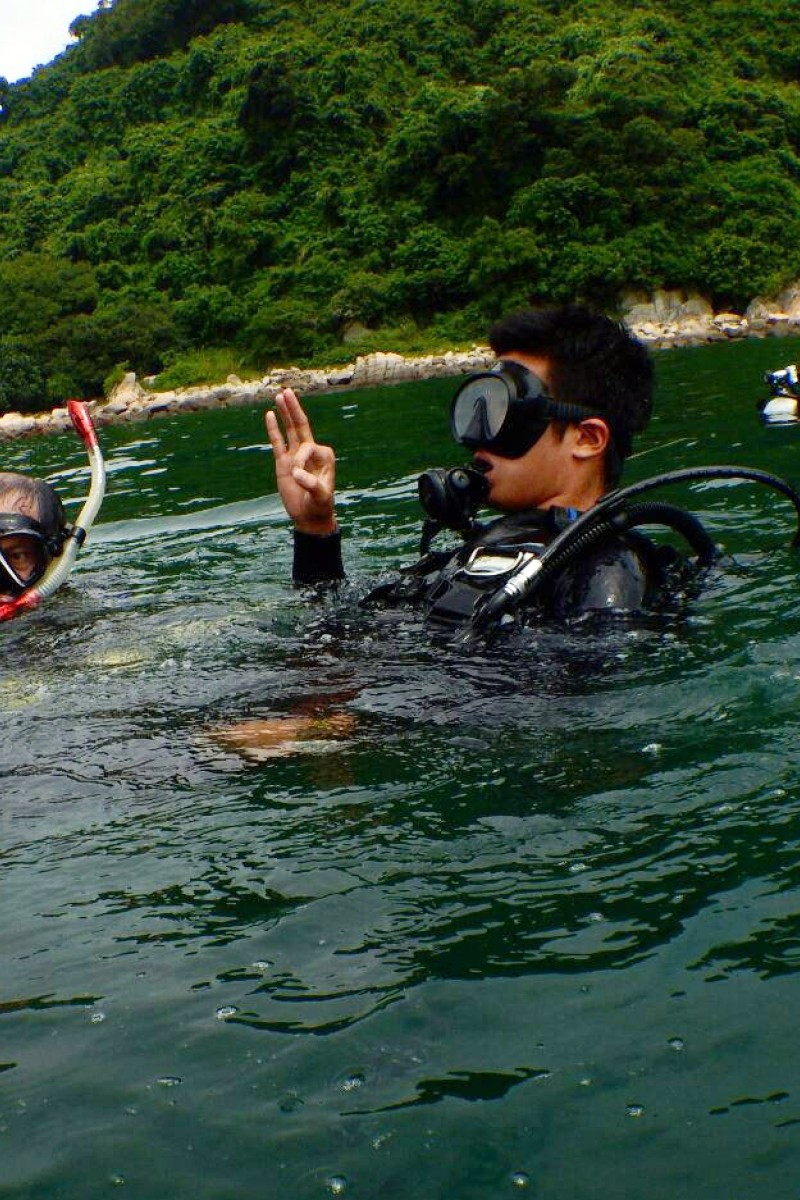
It's not all trash and pollution under the surface of Hong Kong's waterways. Lauren James joined junior reporters Ho Chak-sum and Gigi Wong to experience scuba diving
 Junior reporter Ho Chak-sum (right) appreciates every detail underwater.
Junior reporter Ho Chak-sum (right) appreciates every detail underwater.From nightmare to dream world
Submechanophobia - the fear of underwater machines - is real. Something about seeing man-made objects underwater gives me the heebie-jeebies like nothing else. This was all I could think about as I jumped off the back of the boat into the murky sea.
My heart rate tripled as our instructors told us to let the air out of our buoyancy vests. With the heavy oxygen tanks on our backs, we quickly sank.
The initial shock of being dragged underwater caused me to panic and splutter. It felt like I was fighting every ounce of human instinct as I drew my first underwater breath.
Being only able to breathe slowly through my mouth felt like having a bad cold, and the plastic regulator was uncomfortable and heavy in my mouth. The tunnel vision of the goggles made it hard to see if my fellow divers were still next to me.
We sank through the cloudy water, moving deeper and closer to the shore. It was dark and disorientating. All I could see were the bright yellow tips of my fins as I tried not to flail and make a fool of myself in front of the calm junior reporters.
Suddenly, all the anxiety was worth it. The sandy seabed came into view, and it wasn't filled with cans and plastic as I'd expected. Instead I saw scarlet coral, fluttering fish, and pulsating sea urchins.
I'd expected the depths of the ocean to be filled with metallic clangs, strange echoes and engine roars, but it was calm and quiet - the only sound was my own breath bubbling past my ears. I closed my eyes and let my limbs hang loose. It was so relaxing.
Sunlight glimmered on the waves above, but the seabed remained clouded. I had the sensation that I could be looking out across a great, sandy plain - if only the fog would lift.
We explored for a little while, floating from the warm shallows to the cool depths, before the oxygen gauges said it was time to return to the surface. We came up a little too close to our boat's rusted hull for my liking - but I was too relaxed to panic about anchors and propellers.
Lauren James
Stress disappears underwater
I love to get away from frantic city life and connect with nature; and scuba diving gave me a chance like no other.
After learning the basic skills and safety procedures, we put on all the equipment and pushed off the edge of the boat into the cool water.
And then we began the best part of scuba diving: breathing underwater. You can only breathe with your mouth; if you breathe in or out with your nose, your mask will either flood with water or get sucked to your face. Once we'd mastered the technique, it was totally worth it.
We entered a whole new world - a paradise where we could glide weightlessly in slow motion, almost like we were flying. Our instructor, Michael Nuyen, of Discover Scuba Diving, said it is like being in the zero gravity of space. Hearing the sound of your own breathing and watching the bubbles float to the surface is soothing and almost hypnotising.
Everything around you slows down and you start to appreciate every detail: from the corals and fish to each grain of sand on the seabed. It's a huge contrast to our normal busy lives.
Suddenly, all the stresses of life went away. Being in this beautiful ecosystem was like entering a new world - one I want to return to again and again.
Ho Chak-sum, 19, University of Hong Kong
Seeing nature - and keeping it safe
Our instructor Nuyen loves scuba diving, and believes it can help the environment. "The increasing popularity of diving should encourage people to think more about the conservation of marine life," he said.
In reality, it's very difficult to prevent a dive from disturbing wildlife. Swimming close to the sand may stir up mud and cover the corals. Nuyen explained that this is why divers need to practise floating at different depths to avoid going too close to the coral reefs.
As coral only grows one or two millimetres each year, one careless touch can snap off 20 to 30 years of growth. Careless hands can also wipe off the mucus layer that protects the fragile structures.
Even touching the creatures that live within coral can damage them - and it may actually be painful for the diver.
The boats that brought us to the dive point had to stay parked at the border of the conservation zone, so the underwater species aren't disturbed by the noisy vessels.
It was good to see action being taken to safeguard marine life. Scuba diving is fun, but the enjoyment shouldn't come at the expense of creatures who actually live in the sea!
Gigi Wong, 20, Hong Kong Polytechnic University